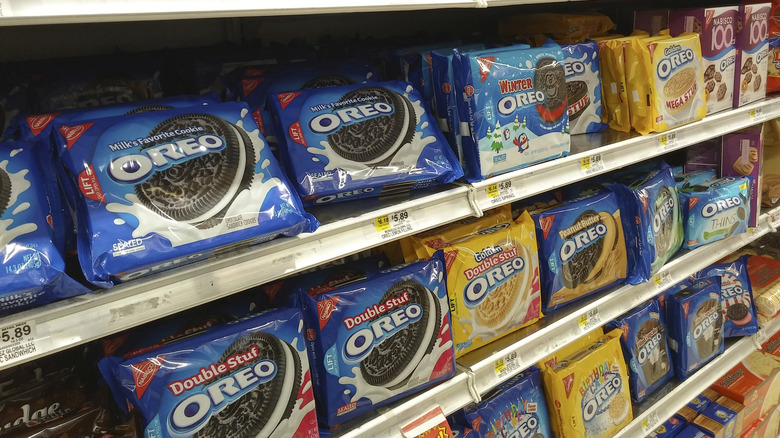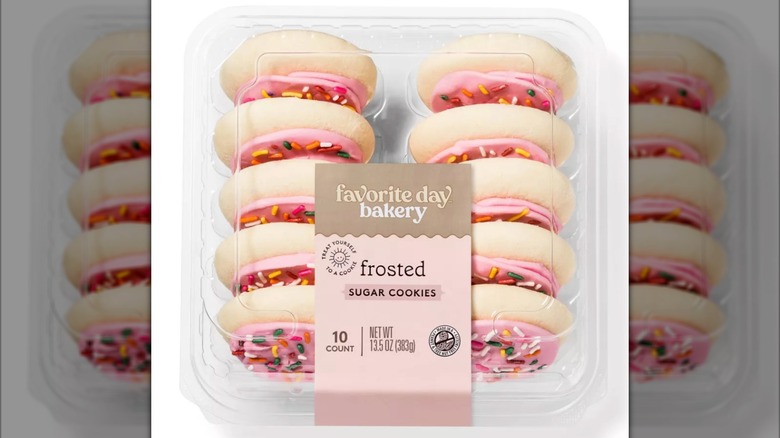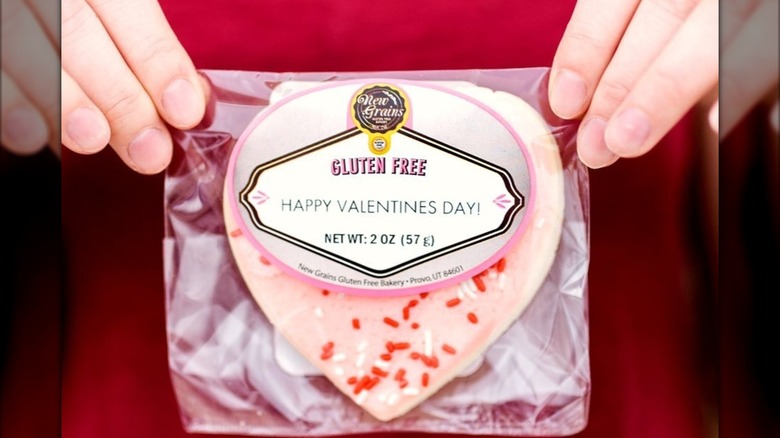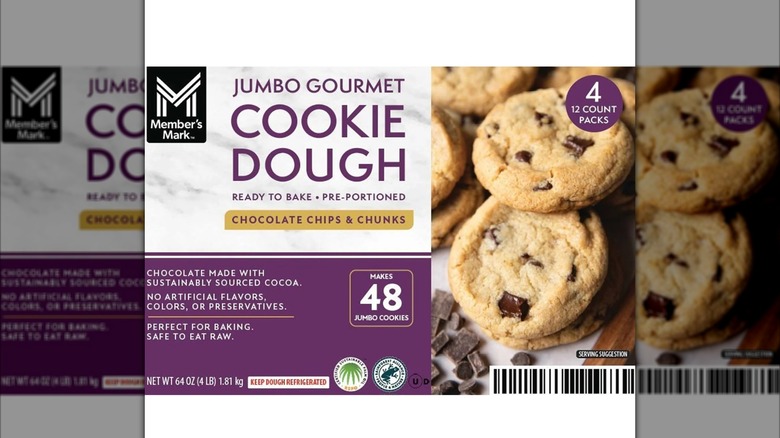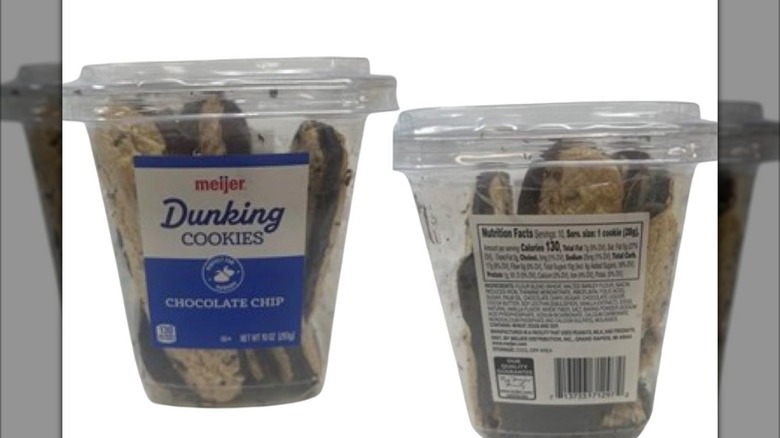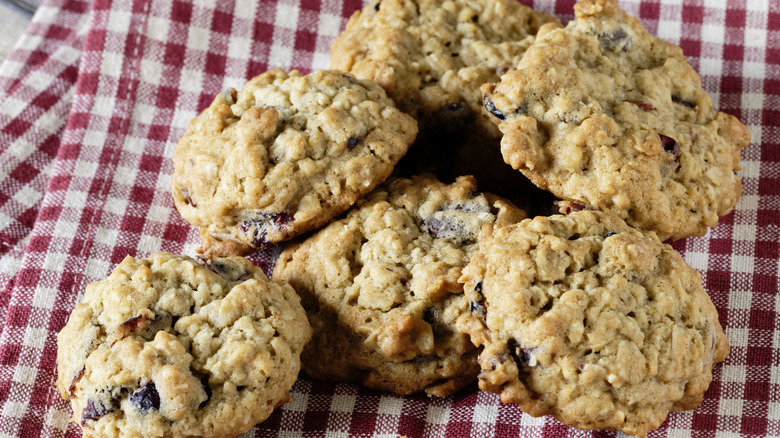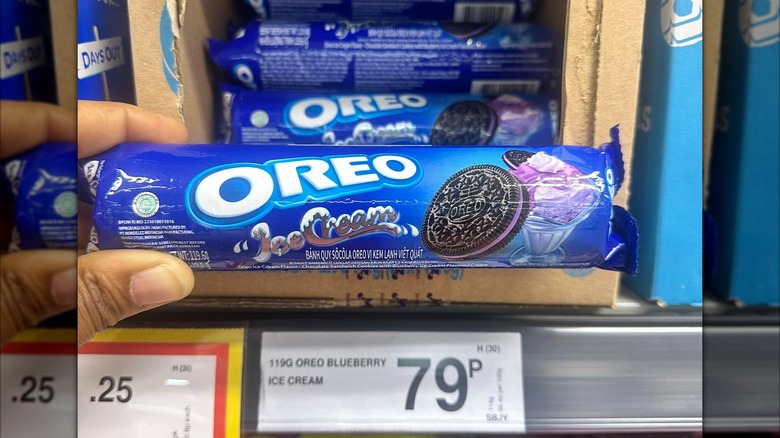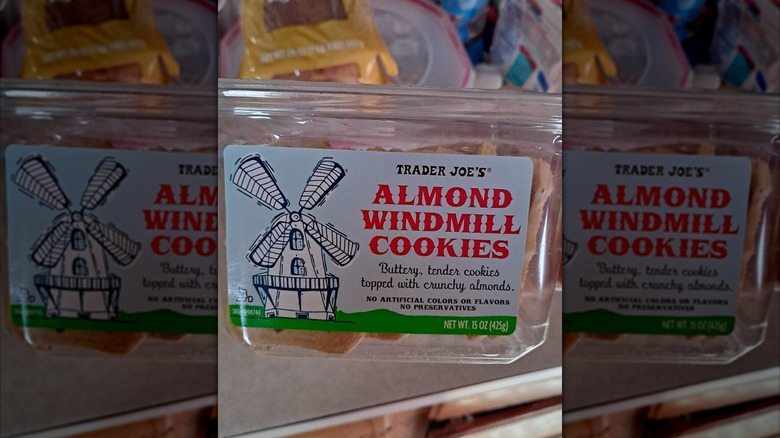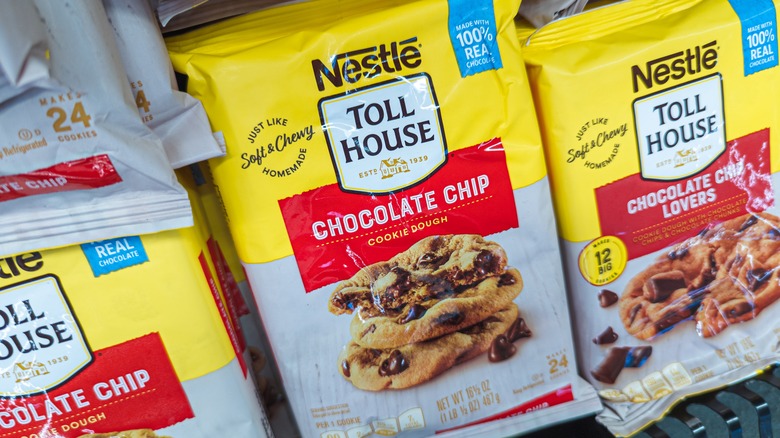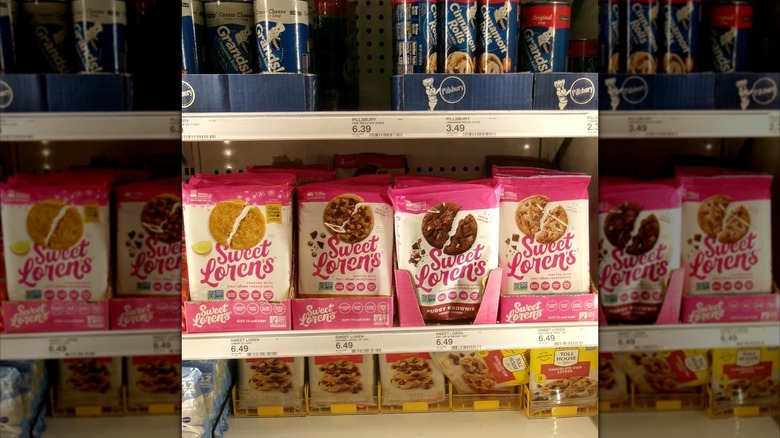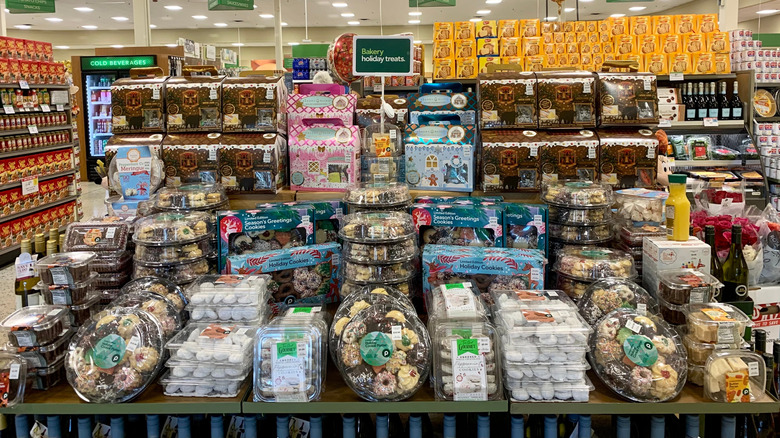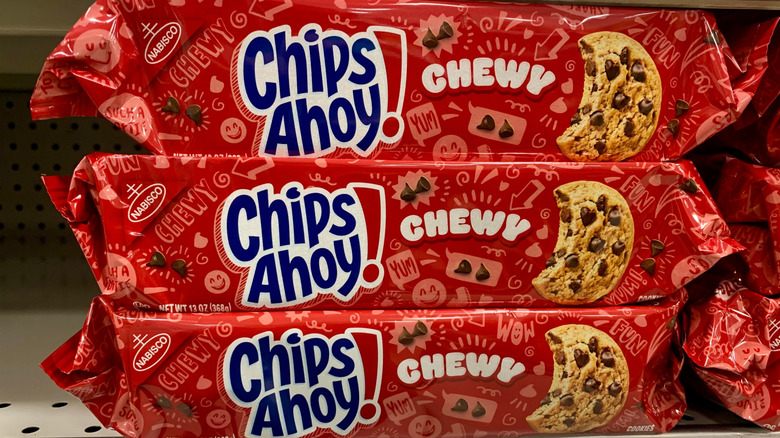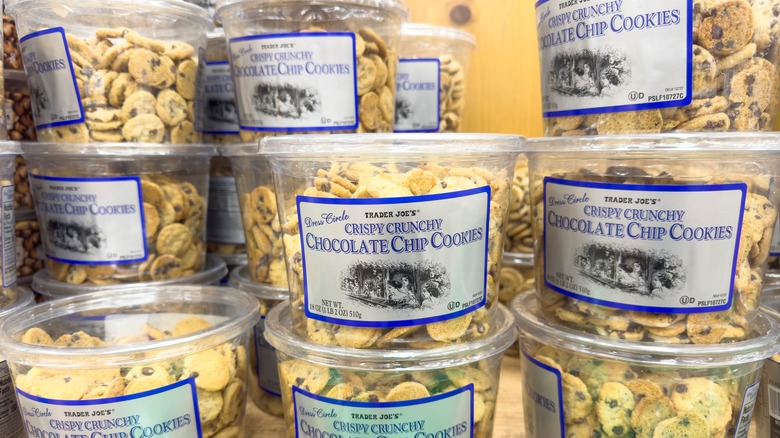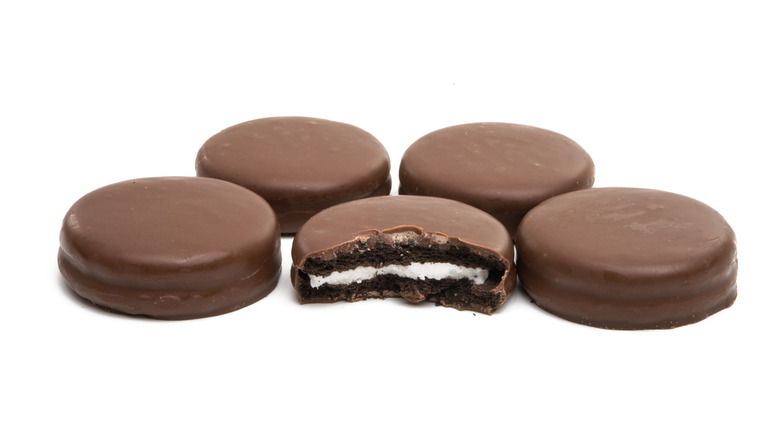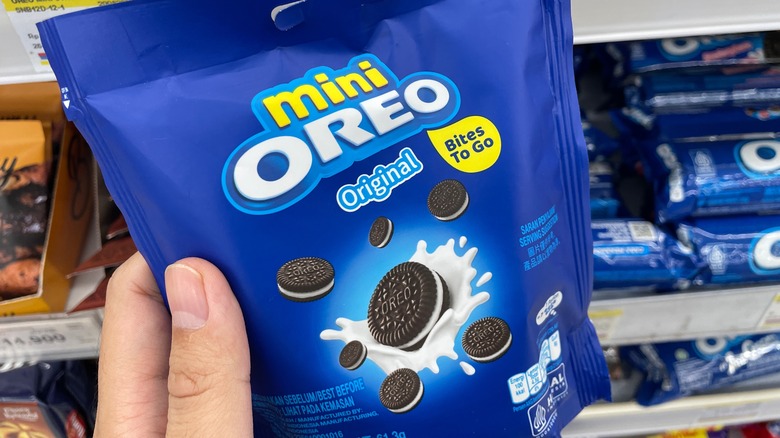14 Cookie Recalls That Impacted Millions
We may receive a commission on purchases made from links.
When you think of food recalls, you might only think of the highly publicized recalls that the likes of meat and fresh produce. These types of recalls are often issued because raw food, handled incorrectly, can harbor bacteria such as listeria and salmonella. These bacteria have triggered some of the country's worst food recalls, triggered by mass illnesses, hospitalizations, and even fatalities. However, meat and fresh produce aren't the only food items sitting at the heart of major recalls.
Seemingly benign pantry and bakery items — including cookies — can pose their own threat. While store-bought, cooked cookies aren't necessarily a great home for bacteria, they do carry other risks that prompt recalls. Foreign materials end up in cookies and become a choking hazard. Undeclared allergens in the cookies can prove dangerous for unlucky individuals. Here are some of the most impactful cookie recalls from the last two decades, and what went wrong.
Target recalls Favorite Day Frosted Sugar Cookies over pieces of wood (2025)
Walk into the bakery section of your local Target, and you'll likely soon find its store-brand Favorite Day Frosted Sugar Cookies pretty quickly. With their thick layer of frosting and crumbly, tender texture, these classic cookies are a favorite with many shoppers, which is probably why Targetalways seems tos have a plentiful supply on hand.
However, in July 2025, some shoppers could have come across an unpleasant surprise in their cookies. Target's Canada-based cookie manufacturer first brought the issue to the public's attention, issuing a recall for more than 800 cases of the cookies, which had been distributed in 20 states and in Washington, D.C. The reason? It was suspected that the cookies could contain small pieces of wood.
As a result, Target removed all of the cookies from its stores and ceased selling any impacted cookies online. Guests who had already purchased the cookies were eligible for a refund. While it sounds odd that wood of all things might make its way into a cookie, it is one of the most common foreign materials found in recalled foods, alongside metal shards, broken glass, plastic, and small rocks.
New Grains Gluten Free Bakery recalled multiple kinds of cookie due to undeclared allergens (2025)
Gluten-free shoppers and shoppers with major food allergies are well-accustomed to scouring the backs of packages, looking for any sign that a store-bought product may contain something that might make them ill. However, if the packaging isn't correct, how can they accurately make an informed decision regarding whether or not something is safe for them to eat?
This is the problem that shoppers would've faced when purchasing any of the cookies that fell under New Grains Gluten Free Bakery's May 2025 recall. Its gluten-free chocolate chip, frosted sugar cookies, and coconut macaroons were gluten-free, as advertised, but they unfortunately also potentially contained major allergens that weren't listed on the packaging, including eggs, soy, and milk.
While the brand reported that they had no knowledge of anyone falling ill due to eating the recalled bakery items, the Food & Drug Administration (FDA) still categorized this recall as a Class I risk. A Class I risk is the highest ranking a recall can receive, and it's given out to those recalls that the FDA feels pose the greatest, potentially even fatal, danger to consumers.
Potential salmonella sparked a cookie dough recall by Rise Baking Company (2024)
While you're unlikely to find salmonella in a cooked cookie considering the fact that salmonella dies between 145 and 165 degrees Fahrenheit, you can find salmonella found in raw cookie dough, thanks to the presence of raw eggs and uncooked flour. Potential salmonella contamination is exactly what prompted Rise Baking Company to recall approximately 30,000 cases of cookie dough in the summer of 2024.
The tricky detail about this recall, though, is that, while it was issued by Rise Baking Company, it impacted plenty of cookie dough brands. Rise Baking Company distributes cookie dough to various stores and chains, with this recall impacting cookie dough sold under Costco's store brand, as well as Member's Mark and Panera Bread, throughout more than 20 states. As such, when keeping an eye on current recalls, be sure to always check if the recalled food is being sold under another brand.
Meijer Dunking Cookies potentially contained undeclared milk (2024)
Meijer Dunking Cookies are made for dipping into a nice, frosty glass of milk. However, even though one might assume that any shopper buying these from the bakery section is taking them home to do just that, not every purchaser can safely drink milk. As such, when it was discovered that the cookies themselves may contain milk without listing it on their label, the manufacturer issued a recall. The cookies were distributed in Meijer stores throughout Michigan, Indiana, Illinois, Ohio, Kentucky, and Wisconsin.
While milk allergies are more common in children and many children grow out of them, for those who do have a milk allergy, consuming milk can result in near-immediate symptoms such as hives, wheezing, throat swelling, and vomiting. The allergy can also result in later symptoms such as gastrointestinal distress and a runny nose. Milk is the third-most common food to cause anaphylaxis.
Gluten caused a recall of Wegmans Outrageous Oat Cookies (2024)
In early 2024, grocery store Wegmans recalled its Outrageous Oat Cookies in eight states after it was discovered that a wheat-containing ingredient had been accidentally added to a certain number of the cookies. This could have proved a big problem for a lot of consumers, as the cookies — which contain oats, coconut, dried fruit, and walnuts — are marketed as being gluten-free.
Obviously, those with a gluten intolerance may have been negatively impacted if they ate the affected cookies, but a smaller portion of the population also lives with celiac disease or a wheat allergy. Whereas those with an intolerance may have experienced painful gastrointestinal distress if they were to eat the cookies, those with celiac disease or a wheat allergy could have suffered much more serious consequences. Luckily, Wegmans said that it did not receive any reports of illnesses related to the grocery store bakery recall.
Multiple varieties of Oreo were recalled over peanuts (2024)
If you live in the United States, your Oreos would have been safe and sound during this recall. However, in 2024, manufacturer Whatever Brands recalled multiple Oreo products throughout the United Kingdom, prompting allergy support organizations to issue statements urging consumers not to eat them.
The affected cookies included traditional Oreos, as well as Oreos stuffed with a variety of flavored fillings, including chocolate, blueberry ice cream, strawberry cream, and dark and white chocolate. The reasoning? The manufacturer suspected that some peanuts or peanut-containing ingredients may have made their way into the cookies, which could be deadly for some consumers. Peanut allergies are the third most common adult food allergy, as, unlike many allergies that develop in childhood and then disappear during adulthood, a peanut allergy typically sticks around for an individual's entire life. Peanut allergies are the leading cause of death from anaphylaxis due to food.
Trader Joe's recalled almond cookies that potentially contained rocks (2023)
In 2023, one of the nation's favorite grocery stores recalled two types of almond cookies: Trader Joe's Almond Windmill Cookies and Trader Joe's Dark Chocolate Chunk and Almond Cookies. The brand said that the cookies could contain small rocks, and that anyone who'd purchased the affected cookies needed to return them to the store for a full refund. This was just one of several recalls issued by Trader Joe's in the span of just a few months, with other recalls due to undeclared milk, metal shards in multigrain crackers, and insects in soup and falafel.
As for the rocks, they likely made their way into food like Trader Joe's cookies a similar way to small sticks or bugs. When manufacturers process ingredients like almonds, they take them right from the field, where the harvesting process can allow extraneous material to mix in with the harvested items. While most of these items are removed during processing, a few are likely to slip through the cracks — and ultimately into your cookies.
Nestle Toll House Chocolate Chip Cookie Dough was potentially contaminated with wood (2023)
Nestle owns over 2,000 different brands, so the company ends up in the headlines for recall-related reasons fairly often. Between beverages and snacks, frozen food and even pet food, there's a lot that can go wrong. In 2023, Nestle recalled its Nestle Toll House chocolate chip cookie dough — not due to salmonella, as you may expect given that it's raw cookie dough, but to small particles of wood.
No illnesses or injuries were reported related to the recall, thankfully, and other Nestle recalls later in the year quickly overshadowed this one, such as an infant formula recall that impacted not just a few batches of the product, but entire countries. Nestle recalled the formula across Bulgaria, Croatia, Czechia, Denmark, Finland, Greece, Hungary, Norway, Poland, Romania, Slovakia, and Sweden, because the formula was potentially contaminated with Cronobacter sakazakii. This can cause sepsis and meningitis, and has potentially fatal consequences for infants — a far bigger deal than just some wood in some cookie dough.
Sweet Loren's initiated a sugar cookie dough recall due to gluten (2022)
While Sweet Loren's may not have quite the same level of brand recognition as Nestle Toll House, the brand has still become a quick favorite with the gluten-free community for its high-quality refrigerated cookie dough, clad in bright pink packaging. As anyone who avoids gluten will tell you, it's hard to find truly delicious gluten-free baked items that can match the texture and taste of a gluten-containing baked good.
Unfortunately, if any gluten-free consumer bit into a sugar cookie made with Sweet Loren's dough in July 2022 and thought that it tasted different from your standard gluten-free cookie, it could've been because the cookie wasn't gluten-free at all. That month, the brand issued a recall noting that some of its sugar cookie dough may contain traces of gluten. While no reported illnesses were linked to the recall, the cookie dough had been distributed far and wide, across retail stores in states such as Florida, New York, New Jersey, and California.
Publix recalled an entire cookie platter potentially contaminated with tree nuts (2020)
If you're in Publix around the holidays and looking for an easy festive treat, you might reach for one of the tasty-looking holiday cookie platters available in the chain's bakery. With a variety of classic Christmas-themed cookies featuring cheery, holiday-appropriate green and red sprinkles, the cookie platters are a no-brainer for brightening up winter days. However, if you or someone in your family suffers from a nut allergy, these seemingly benign cookies could've proven dangerous in December 2020.
Publix had to issue a recall as the cookie platters featured cookies that contained pecans, even though pecans were not listed or declared on the platter's ingredients label. The cookie platters had been distributed across Florida (except Miami-Dade, Palm Beach, Broward, and Monroe counties), Georgia, Alabama, Tennessee, South Carolina, North Carolina, and Virginia. While not as common as peanut allergies, tree nut allergies are still considered one of the nine major food allergens impacting both kids and adults. Pecans are one of multiple nuts that fall under this category, alongside cashews, walnuts, pistachios, hazelnuts, and almonds.
Mondelēz discovered an ingredient issue impacting Chips Ahoy Chewy Cookies (2019)
In April 2019, Mondelēz, the maker of Chips Ahoy cookies — as well as a bevy of other snack brands, including Ritz, Triscuit, and Wheat Thins — recalled the brand's Chewy variety of chocolate chip cookies for an interesting reason. The official report shared by the Food & Drug Administration explained that the recall was due to an "unexpected solidified ingredient." The cookies had been distributed nationwide.
On the surface, an unexpected solidified ingredient sounds a little frightening. Typically, recalls explicitly state if a food is contaminated with a foreign material, such as a piece of wood or rubber. CBS reached out to Mondelēz to get down to the bottom of this vague phrase's meaning, with a spokesperson claiming that it simply referred to cornstarch in the cookie recipe that didn't properly mix in with the other ingredients and hardened when the cookies were baked. That sounds significantly less scary, but don't make the mistake of thinking the cookies were harmless. The spokesperson noted that there were unconfirmed reports of consumers gagging and choking on the hardened cornstarch, as well as experiencing dental injuries.
A chocolate chip cookie mix-up led to a recall by Trader Joe's (2018)
Sometimes, a recall occurs not because there's anything necessarily wrong with the food, or because the food contains an allergen not listed on the packaging. Instead, sometimes manufacturers put the wrong product in the packaging altogether, surprising consumers who expect one product and get another. This was what occurred in 2018 when Trader Joe's recalled some bags of its chocolate chip cookies. Instead of chocolate chip cookies being placed in the bags, the bags contained chocolate chip peanut butter cookies. Close, but no cigar.
Of course, the real risk here isn't merely unhappy consumers who've had chocolate chip peanut butter cookies forced upon them when they really wanted to buy plain chocolate chip cookies, sans peanut butter. Instead, for anyone with a peanut allergy, the cookies could have potentially proven lethal. The cookies had been distributed to Trader Joe's stores in a dozen states, plus Washington, D.C. Fortunately, no reactions were linked to the cookie mishap.
Pure Milk Chocolate Covered Oreo Sandwich Cookies were recalled over allergen fears (2005)
More than a decade before Trader Joe's recalled its chocolate chip cookies because peanut-containing cookies had found their way into their bags, Oreo issued a very similar recall. In July 2005, Oreo's parent company, Nabisco (which was later merged into the Mondelēz family), said that over 800,000 boxes of its Pure Milk Chocolate Covered Oreo Sandwich Cookies needed to make their way back to stores, as it was discovered that some of those boxes could have included Oreos stuffed with peanut butter creme, not vanilla creme, by mistake.
Luckily, the boxes for this product did state that the cookies were made on equipment that comes into contact with peanuts. As a result, customers were aware that peanut exposure was a risk when eating the cookies, which hopefully warned off anyone with a severe peanut allergy. Nabisco said that no allergic reactions or other issues had been reported in relation to the recall, and that it only found out about the mistake after a consumer complained about finding the peanut butter creme-filled Oreos in their box.
Nabisco recalled packages of mini Oreos after a packaging error (2004)
In 2004, there was yet another product mix-up that led to a Nabisco recall. This time, instead of putting the wrong flavor of cookie in the packaging, it accidentally used an entirely different type of product: the Ritz Bits Cheese Sandwiches. Cartons of Oreos impacted by the packaging error went out to BJ's Wholesale Club stores across the eastern U.S. Eventually, shoppers in two states (Massachusetts and New Hampshire) discovered that the cartons of what they thought were mini Oreos actually contained the much more savory Ritz crackers.
Much like Nabisco's peanut butter Oreo swap, this swap posed a threat to those with a milk allergy or intolerance. While Oreos (somewhat surprisingly) do not contain any dairy ingredients, Ritz Bits do contain milk. As such, if someone had grabbed a pack thinking they were getting Oreos, found the cheesy crackers, and decided to snack on them anyway, they potentially faced some uncomfortable or dangerous symptoms. Fortunately, nobody reported any illnesses linked to the Nabisco mix-up.
